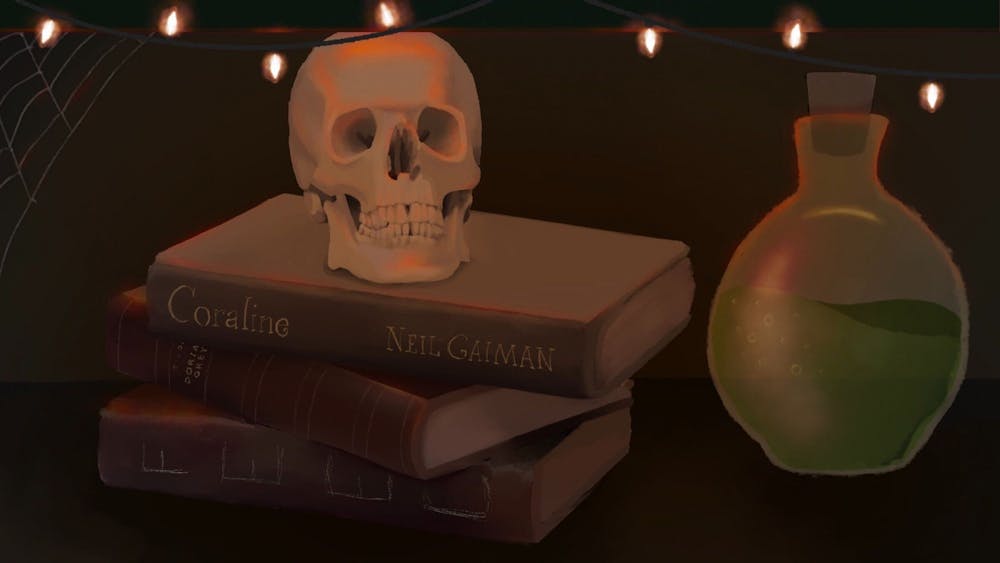Halloween may be more than a month away, but during the coronavirus pandemic, I’m looking for ways to escape from reality just for a bit. From classic novels to a memoir by the king of horror, you’re sure to find a book on this list you’ll love:
“Feed” by M.T. Anderson
I like to think “Feed” takes cell phone addiction to an extreme. While the book isn’t violent or gross like many horror novels are, it still really haunted me for a while.
In “Feed,” everyone has a device implanted in their brain that functions like a cell phone –people can watch videos, shop online and communicate with friends in their mind. Because of the ease of having the world’s information at their fingertips, the characters lack the ability to think for themselves.
One of them is Titus, who has grown up with a “feed,” as it’s called in the novel, implanted in his brain his entire life. He lacks a good vocabulary, motivation and especially emotional depth as the world decays around him. It takes a girl named Violet who questions the feed to make him even somewhat animated.
“Fahrenheit 451” by Ray Bradbury
Even though many people probably read “Fahrenheit 451” in school, I've found reading a book for class can take away some of its meaning.
“Fahrenheit 451” follows Guy Montag, a “fireman,” whose job is to burn books and other forms of knowledge. I find the novel to be fitting for the current time, seeing that knowledge is more fragile and hard to come by than ever. Even President Trump hides knowledge from the public – so this book wasn’t so far off in predicting a dystopia.
Bradbury’s masterpiece gives me chills to this day and deserves a sincere re-read from people who have read it before. Let the parallels between today and the dystopian world depicted in the novel sink in – it’ll definitely freak you out.
“Coraline” by Neil Gaiman
A personal favorite of mine, “Coraline” follows an adventurous young girl in her new home in Oregon. Constantly ignored by her tired parents, Coraline seeks attention, and is delighted to find the loving “Other Mother” and “Other Father” when she walks through a secret door in her house.
The novel’s initial dreariness contrasted with sudden bursts of intensely frightening imagery contribute to it being one of the most horrifying books I’ve ever read. The true beauty of the novel is in the simplicity at its core: Coraline feels forgotten and unloved, which is a feeling many can relate to. To combat this, many people turn to escapism, such as books, movies and hobbies.
What I love the most about “Coraline” is Gaiman’s ability to twist Coraline’s search for escapism into literal escapism.
“On Writing: A Memoir of the Craft” by Stephen King
This memoir documents how King came to love the genres of horror, sci-fi and thrillers, and how he came to be a great writer of said stories. King also provides great advice for aspiring writers.
The memoir is surprisingly emotional and refreshing. If you’re a lover of nonfiction horror, this is the book for you.
“Frankenstein” by Mary Shelley
It’s hard to beat this book when searching for some classic Halloween fun. “Frankenstein” begins with student Victor Frankenstein as he tells Captain Robert Walton of the monster he created, who is incredibly smart and experiences the same emotions as a human would. However, due to his appearance, people are frightened of him, so he constantly wanders around in search of someone who will love him.
Shelley wrote this during a writing competition among her and her friends. Maybe use that as inspiration and spark a creative writing competition with yourself and others. Who knows? You could end up writing something as important as “Frankenstein.”
“The Picture of Dorian Gray” by Oscar Wilde
Wilde’s novel compellingly twists everyday happenings of upper-class 19th century citizens with gradual horror.
Dorian Gray, a young man in England, is the muse of painter Basil Hallward. One day, Hallward’s friend, Lord Henry Wotton, enters the painting studio and Gray takes to heart Wotton’s rants of how beauty is the only thing that matters in the world.
Wilde paints a creepy portrait of the dangers of becoming too egotistical and sure of one’s outward appearance. What I love most about the novel is what I mentioned earlier – it starts off sounding like a Jane Austen romance novel. But it soon turns entertainingly dark.




